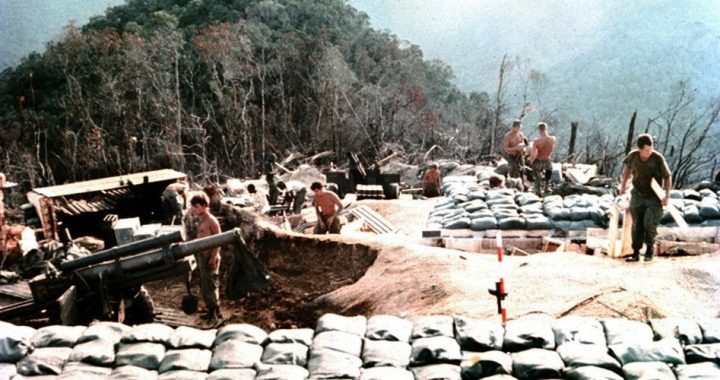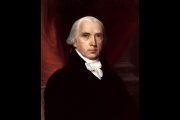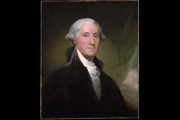
It was not a pleasant memory when April 30 dawned and, with it, the realization that it marked the 40th anniversary of “the fall of Saigon.” For it was on that date in 1975 that the last of the Americans in the former Indochina were evacuated by helicopter from the roof of the U.S. embassy, as all the world watched via satellite the ignominious end of America’s decade-long war to “save South Vietnam from Communist domination.” Forty years — half a lifetime for even the octogenarians among us — is a long time to be fretting over a lost war half a world away. But chances are some of the unanswered questions and unresolved debates over that ill-fated conflict may linger for another 40 years or more, long after those who fought in the war and, those who fought over it, are all dead and gone.
When did America’s leaders decide the war in Vietnam was not “winnable”? Conventional wisdom, along with some published histories of the era, suggest National Security Advisor (and later Secretary of State) Henry Kissinger convinced Richard Nixon victory was unattainable early in Nixon’s first term, when Americans were dying in Vietnam at the rate of 1,200 a month and the American public had long since grown tired of waiting for the “light at the end of the tunnel” to finally break through the darkness of a seemingly endless war.
Was it, in fact, too late for victory when Nixon came to the White House in 1969, four years after Lyndon Johnson had committed combat troops and a continuing air war to Vietnam? Might the war have been won if Johnson had removed some of the restrictions on our war effort — if he had, for example, opened the air war to more “targets of opportunity,” had mined Haiphong Harbor, as Nixon belatedly did, and attacked Viet Cong and North Vietnamese Army sanctuaries in Cambodia as Nixon briefly did in the spring of 1970?
In fact, while the Vietnamese communists had the “home-field advantage,” we had throughout the war air supremacy, superior weapons and material, and troops on the ground who won nearly every battle in the war. So when and by whom was it decided that the war was “unwinnable”?
Many long years after Lyndon Johnson had gone to his reward, tape recordings of some of his White House conversations were released. Among them was a phone conversation between Johnson and McGeorge Bundy, one of the Kennedy and Johnson aides often credited with having been a major architect of the American war in Vietnam. Consider just some of what the president had to say: “I don’t think it’s worth fighting for, and I don’t think we can get out,” surmised Johnson, who went on to say, “What in the hell is Vietnam worth to me? What is Laos worth to me? What is it worth to this country?”
Anyone who didn’t know might guess that brooding observation came late in Johnson’s time in office, perhaps in 1968, somewhere between the Tet offensive in January and Johnson’s announcement at the end of March that he would not seek “another term as your president.” But the conversation took place on May 27, 1964. As columnist George Will noted, “At the time, there were only 16,000 U.S. forces in Vietnam, where there had been only 266 U.S. deaths. The U.S. deployment would peak at more than 500,000 in 1969 and 58,000 would die there.” Another 300,000 Americans would be wounded. Vietnamese deaths from the war have been estimated at two to three million.
Had Johnson really concluded Vietnam was “not worth fighting for” as early as the spring of 1964 — before the bogus “attacks” by North Vietnam on American vessels in the Gulf of Tonkin and the passage by Congress of the Vietnam Resolution, which would later serve the president as a “functional declaration of war”? In his campaign for election that fall, Johnson promised the nation: “We are not about to send American boys nine or 10 thousand miles away from home to do what Asian boys ought to be doing for themselves.” The next year he began sending tens of thousands, and then hundreds of thousands, of “American boys” overseas to do just that.
For what purpose? In his account of how Vietnam policy was shaped in high places entitled The Best and the Brightest, author David Halberstam described a meeting at the White House among President Johnson, Vice President Hubert Humphrey and retired Army General Matthew Ridgway. When Johnson had left the room for a moment, Ridgway turned to Humphrey and asked what exactly the mission was that had been given to General William Westmoreland, the commander of U.S. forces in Vietnam.
“That’s a good question,” Humphrey reportedly said. “You should ask the president.” When Johnson reentered the room, talking about the great burdens of his office, Ridgway did not repeat the question. Nor did he, or the nation, ever get an answer.
The John Birch Society was virtually alone in asking why we were fighting to prevent South Vietnam from falling to the communists at the same time we were favoring communist countries elsewhere with trade and aid. Trade with the Soviet Union continued throughout the war, even though the Soviets were the biggest suppliers of arms and equipment to North Vietnam. Sales to Russia included parts for trucks that moved North Vietnamese troops and supplies down the Ho Chi Minh Trail into South Vietnam, and parts used in antiaircraft weapons to shoot down American planes and pilots.
To be sure, then as now, a growing number of inter-related industries in the network that had come to be known as the military-industrial complex was profiting from the war, despite the burden it placed on the economy as a whole. But did that alone explain our government’s interest in continuing to prosecute a no-win war in Vietnam? Back in 1965, as the United States was just beginning its combat mission, Robert Welch, founder of The John Birch Society, was publicly raising the questions few others were asking:
What are we fighting for? What are we trying to accomplish? What are our goals? What is our real purpose? Nobody knows — or at least nobody in the administration is willing to say. And it is only when that question is answered honestly that the whole business makes sense and, paradoxically, becomes crazier than ever.
The answer Welch offered no doubt struck many people as too simple to be true. “For the purpose of our being at war in Vietnam, ladies and gentlemen, is simply to be at war.” The strategy he described was not new but has been pursued by rulers for centuries. It was summed up, Welch noted, by Shakespeare, who depicted King Henry IV advising his heir, Prince Hal, to “busy giddy minds/ With foreign quarrels; that action, hence borne out/ May waste the memory of the former days.”
The idea of using “foreign quarrels” to distract public attention from the frequent follies and nefarious designs of their own rulers is a familiar theme of both history and literature. It consumes a major part of George Orwell’s story in 1984. In his celebrated work Democracy in America, 19th century French statesman Alexis de Tocqueville wrote: “All those who seek to destroy the liberties of democratic nations ought to know that war is the surest and the shortest means to accomplish it.”
James Madison was of a similar mind. “Of all the enemies to public liberty,” he wrote, “war is, perhaps, the most to be dreaded, because it comprises and develops the germ of every other. War is the parent of armies; from these proceed debts and taxes; and armies, and debts, and taxes are the known instruments for bringing the many under the domination of the few…. No nation could preserve its freedom in the midst of continual warfare.”
Yet continual warfare has become the “new normal” in American life, and both its purpose and effect were described by Robert Welch in 1965:
For the objective is not simply to distract the attention of gullible minds from the steady advance of state socialism and government regimentation at home, although this it certainly does, but the more sinister but parallel purpose is to use the very fact of our being at war as an excuse and a means of speeding up that advance, of gradually completing the transition into state socialism and of converting the increasing and tightening regimentation into the framework of a totalitarian police state.
To be sure, we have not yet arrived at a “totalitarian police state.” But have we not advanced a considerable distance in that direction over the past half-century? Even as Welch was describing it, Lyndon Johnson and a compliant Congress were building an ever-larger welfare-warfare state — a benevolent nanny state at home and an escalating war in Southeast Asia in accordance with the president’s policy of “guns and butter.” Ever since then, the controls have gotten tighter to the point where the government in Washington now controls everything from the size and capacity of your toilet bowl to the kind of light bulb you may buy. The mud puddle on your property may be an environmentally protected “wetland,” and by moving dirt to fill it, you might be criminally violating the habitat of a kangaroo rat.
But it is even worse than that. Police in our cities and towns are being equipped with military weapons and vehicles as though at war with their own populace. People seeking personal freedom come under suspicion of being subversives or terrorists. It is no longer news that our government has condoned the torture of foreign prisoners with “enhanced interrogation techniques,” and reports of police abuse and killing of unarmed suspects here at home have become too numerous to be dismissed any longer as “isolated incidents.”
Congress routinely passes renewals of the National Defense Authorization Act that authorize the president to hold terror suspects without trial, including American citizens apprehended here in the United State where “the homeland” is considered part of the battlefield. The president of the United States uses drone strikes to kill Americans overseas, far from any battlefield. And it took a filibuster by a United States senator to get the attorney general of the United States to acknowledge that the president does not have the authority to use drone strikes against Americans here in the United States.
Our politicians seldom speak any more of liberty, preferring promises of jobs and security. Slaves have jobs and security. A commitment to liberty is what is lacking and liberty, as Madison observed, is mortally threatened when a nation is “in the midst of continual warfare.”
Our government only recently ended its warfare in Iraq over mythical “weapons of mass destruction.” It remains engaged in war in Afghanistan and in an air war against the Islamic State of Iraq and Syria. Yet familiar voices, sounding like war drums, are now clamoring for increasingly aggressive measures, leading quite possibly to war, against Iran over that country’s alleged nuclear weapons program. Will our nation, so often described as “war-weary,” rise up to stop the march toward the next Vietnam or Iraq, another “perpetual war for perpetual peace”?
“Or,” as Robert Welch asked 50 years ago, “will the American people simply never learn from experience?”
Photo of U.S. Marines in Vietnam in 1968



